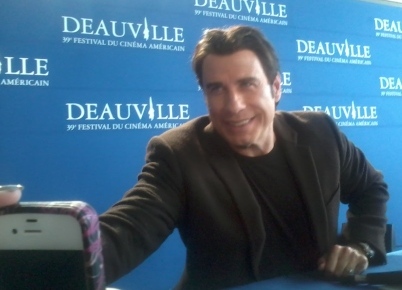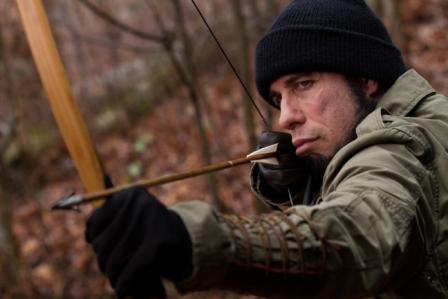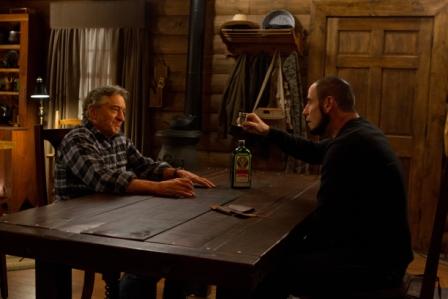"The joy of creating is not unlike being in the air as a pilot and experiencing the joy of soaring," John Travolta, a veteran pilot, with his own Boeing 707, told us at his press conference at the Deauville American Film Festival, which honored him with a career tribute for his more than fifty films, from Saturday Night Fever and Carrie to his newest role in Mark Steven Johnson's Killing Season. With the grin of a happy child, he leaned forward and confided that his secret to success was taking a pilot's approach to his craft. "In life you should approach everything you do professionally with a list of things you have to do. Like when you are in a plane, in a cockpit, you have to understand the instruments, the emergency procedure. With a movie, you do the research, the accent, costume, the physical comportment."

In his latest film, Killing Season, the greatest challenge for Travolta "was doing the research, putting the pieces together", to prepare for his role as a former Serbian soldier who had committed atrocities in the Bosnian war.
The movie is the story of two war veterans who meet in the isolated woods of the Appalachian mountains: one, the Serbian ex-soldier, played by Travolta, the other a former American soldier, played by Robert DeNiro. The two, we eventually learn, had already met years before in the Bosnian war, during the NATO intervention. Their confrontation now in the snowy woods is a way to exorcise the trauma of their past in the war, with even more violence. Basically, the movie is a violent game of one-up-manship, where one vet hunts and tortures the other, and then vice versa. "There is a thin layer of blood over everything," comments one of the two. The war is not finished.

What research did Travolta have to do?
"I flew to Bosnia and interviewed 25 former Serbian, Croatian and Muslim soldiers. My research was to understand the war and try to understand what would motivate your average guy to commit atrocities."
Dapper and serious in his brown jacket, and perfect goatee, Travolta continued in a sincere quiet voice to discuss in detail what he learned about war. "I discovered that the real reason for the war in Bosnia was not religion and politics, but the bigger countries behind the smaller countries, encouraging the war, for financial gain. Religion and politics are a façade. I also discovered that man for the most part is mostly good, but can be persuaded by a moral code to do something evil. The healthier will feel remorse about it. The unhealthy ones never feel remorse."
His comment about remorse is a clue to how to read his character Emil Kovac in the movie, who does go through a momentous--albeit not totally believable (it is very quick)--reversal, from vengeance to remorse. For director and actor, the film is ostensibly about conscience, showcasing the effects of what happens when you treat human beings like "meat and flesh and tendons." Travolta personally endorses the anti-war message: "I was a young man in the 60s, 70s, so I grew up with war protests and my heart was with them."
This anti-war message is lost on spectators. More than a few who left the French premiere this weekend said: "That was fun action flick with good acting."
The acting is what makes this film--so wrought with gory tension---enjoyable. Robert DeNiro plays his role with the gravity of a serious elder man, bringing to the fore his fifty years of experience. Travolta is a perfect complement, with his childlike ebullient energy and infectious smile--and well-crafted Serbian accent. The energies of the two men are so different that the scuffle of shifts in power comes off like a wild ping-pong match, making the violence almost humorous, especially the scene where both men survive a car spinning off a cliff, only to attack once more.

Travolta's ebullient energy was apparent as he charmed the room of journalists, with the Atlantic ocean shimmering behind him through the transparent walls. On the red carpet later that day, he was the only actor at the festival who was so generous as to respond to every request for an autograph along the line, one after another, to the entrance. And when accepting his award for his career at the awards ceremony, he hopped out onto the stage, brimming with excitement, and gave an adorable speech completely in French beginning with "Je t'aime" and ending with kisses to the public.
His acting began very young, as a child. "My mother was an actress and every night she would go to the theater so every night I would go to the theater," Travolta told us. "From age three to twelve, I watched my mother and sisters on stage and some movies, like La Strada and Yankee Doodle Dandy, and that created the acting bug.
"Have you met your childhood dreams?" one journalist asked.
"Retrospectively, my career went far beyond the dreams I had for myself as a child. I would have been happy to just make a living as an actor."
